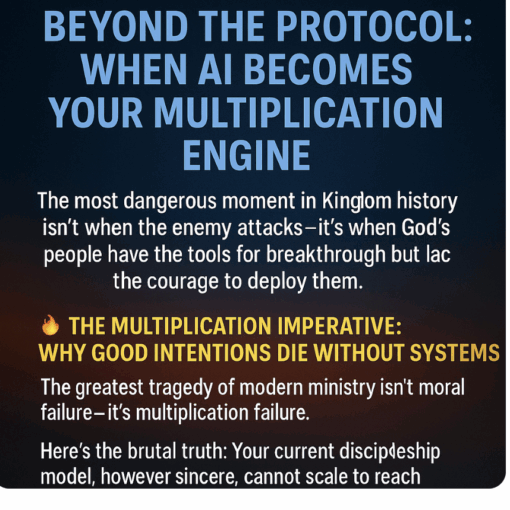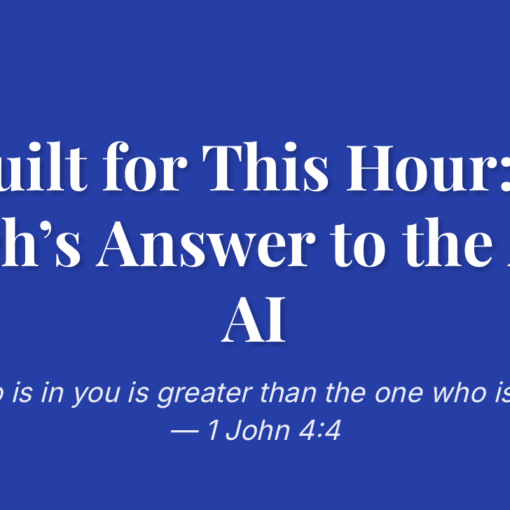
What if the exhaustion plaguing modern pastors isn’t a failure of calling but the natural result of carrying responsibilities that Jesus never intended spiritual leaders to bear?
You became a pastor to shepherd souls, but you spend most of your time managing systems that didn’t exist in the early Church. Building maintenance, program coordination, weekly performances, and institutional fundraising consume energy that could transform lives through authentic ministry. The very structures designed to support your calling often become obstacles to the spiritual leadership you felt called to provide.
Research into early Church practices reveals a startling truth: many traditions that create pastoral burden have no biblical foundation. They emerged centuries after the apostolic era through cultural accommodation rather than divine revelation. What if artificial intelligence could help you escape inherited traditions that hinder ministry effectiveness while restoring biblical patterns that actually work?
This isn’t about destroying what God has built through your faithful service. This is about discovering tools that can eliminate unbiblical burdens while amplifying authentic spiritual leadership. AI offers pastors the first real opportunity in centuries to minister as Jesus intended—focused on people rather than programs, relationships rather than religious machinery.
Welcome to your liberation from traditions that exhaust while embracing technology that empowers.
🏛️ The Inherited Burden: When Traditions Become Chains
Every pastor knows the feeling: you entered ministry with passion for souls but find yourself trapped in endless cycles of program management, building oversight, and performance preparation. The excitement of spiritual calling gradually diminishes under the weight of institutional expectations that consume time meant for prayer, study, and personal ministry.
Here’s the liberating truth: most pastoral burdens didn’t come from Jesus. The weekly sermon performance? Unknown in early Christianity where believers gathered for interactive teaching and mutual edification. The building management responsibility? Unnecessary when believers met in homes that belonged to members rather than institutions. The professional clergy isolation? Absent when spiritual leadership functioned through teams of elders rather than individual pastors.
These traditions developed gradually through cultural accommodation to Roman imperial structures, Greek educational systems, and medieval religious hierarchies. What felt like Christian civilization was often pagan culture wearing Christian labels. The early Church operated with stunning simplicity: believers gathering in homes, sharing meals, exercising spiritual gifts, and multiplying through organic relationships.
The administrative complexity that exhausts modern pastors didn’t exist because the systems that create complexity hadn’t been invented yet. No church buildings to maintain, no weekly performances to prepare, no institutional budgets to manage, no professional religious roles to fill. Just spiritual leaders who focused on what only spiritual leaders can do: shepherd souls, teach truth, and equip believers for ministry.
But cultural momentum makes these inherited burdens feel inevitable—until technology offers alternatives that can restore biblical simplicity while serving contemporary needs.
⚡ The Performance Trap: From Pulpit Monarchy to Participatory Ministry
The most exhausting aspect of modern pastoral ministry might be the weekly pressure to deliver inspiring performances for passive audiences. Every Sunday demands fresh content, engaging delivery, and spiritual impact that depends entirely on your individual preparation and presentation skills. One person carrying responsibility for the spiritual inspiration of hundreds creates unsustainable pressure.
But this performance model has no biblical precedent. Early believers gathered for interactive participation where “each of you has a hymn, or a word of instruction, a revelation, a tongue or an interpretation” (1 Corinthians 14:26). No single person monopolized spiritual communication because the community functioned as a body where every member contributed according to their gifts.
The shift from participatory to performance-based worship happened gradually through adoption of Greek rhetorical traditions and Roman imperial ceremony. What began as organic spiritual community became theatrical religious presentation. The result? Pastors burning out from performance pressure while congregations atrophy from spiritual passivity.
Artificial intelligence can help you escape the performance trap by enabling participatory ministry that reduces pastoral burden while increasing congregational engagement. Digital platforms allow members to contribute teachings, testimonies, and spiritual insights throughout the week. AI coordination ensures balanced participation without human control mechanisms that stifle organic spiritual expression.
Instead of carrying sole responsibility for weekly inspiration, you become a facilitator of community spiritual life.Members arrive at gathering prepared through weekly engagement with biblical content, ready to contribute rather than simply consume. Your role transforms from performing for audiences to shepherding participatory community—which is exactly what the New Testament describes.
Technology restores biblical patterns while eliminating performance pressure that never belonged to pastoral calling.
🏠 The Building Liberation: From Sacred Space Management to Sacred Community
One of your most draining responsibilities probably involves building-related decisions, maintenance coordination, and facility management that has nothing to do with spiritual leadership. Roof repairs, lighting systems, seating arrangements, and property management consume pastoral energy while contributing nothing to soul care or spiritual formation.
Here’s the freeing revelation: church buildings weren’t part of Christianity for the first three centuries. Believers met in homes, shared meals, and experienced authentic community in spaces designed for family life rather than religious performance. No sacred architecture, no facility maintenance, no building fund campaigns—just spiritual family gathering in environments that naturally fostered intimate relationships.
The transition to dedicated religious buildings began when Christianity became the Roman Empire’s official religion. Suddenly, believers needed impressive structures to compete with pagan temples and imperial facilities. What gained institutional respectability lost relational intimacy—the very quality that made early Christianity revolutionary.
AI-enabled house church networks can liberate you from building management while restoring the intimate community that transforms lives. Digital platforms coordinate multiple home gatherings, provide training resources for lay leaders, and maintain doctrinal consistency without requiring centralized facilities. Your pastoral oversight multiplies across numerous intimate settings rather than being confined to one large, impersonal space.
This doesn’t eliminate the value of corporate worship—it multiplies worship opportunities while reducing pastoral infrastructure burden. When believers gather in homes throughout the week for discipleship, prayer, and community life, Sunday morning becomes celebration rather than the only spiritual interaction most people experience.
Building liberation through AI means you focus on building people rather than maintaining properties, developing relationships rather than managing real estate, and shepherding souls rather than overseeing facilities.
💰 The Financial Freedom: From Institutional Fundraising to Kingdom Enterprise
Every pastor knows the exhaustion of constant financial pressure: building maintenance costs, salary obligations, program expenses, and the endless need to motivate giving from people who already feel financially stretched. You entered ministry to feed souls, but you spend considerable time managing budgets and coordinating fundraising for institutional survival.
The early Church operated without these financial burdens because they didn’t have institutional overhead. No building maintenance, no professional salaries, no program budgets—just believers sharing resources naturally within spiritual family relationships. Financial needs were met through community generosity rather than institutional campaigns.
The professional clergy system that creates salary obligations didn’t exist in the New Testament era. Spiritual leadership functioned through teams of elders who supported themselves through regular work while exercising pastoral gifts. Paul the apostle worked as a tentmaker, demonstrating that spiritual authority doesn’t require financial dependence on congregational giving.
Kingdom business integration through AI can liberate your church from institutional fundraising while generating resources for ministry multiplication. Digital platforms enable members to operate enterprises that serve both financial sustainability and spiritual advancement. Instead of depending on member donations for operational survival, the church becomes economically productive while making disciples through marketplace ministry.
AI-coordinated business networks allow your congregation to generate wealth that supports ministry rather than consuming wealth for institutional maintenance. Members operate businesses that serve community needs while providing natural evangelism and discipleship opportunities. Commerce becomes ministry rather than competing with ministry for time and resources.
This financial freedom means you can focus on spiritual leadership rather than fundraising, soul care rather than budget management, and Kingdom advancement rather than institutional survival. When the church generates resources through productive activity, pastoral energy flows toward spiritual multiplication rather than financial maintenance.
⚔️ The Clerical Liberation: From Lone Ranger to Team Leadership
The most isolating aspect of modern pastoral ministry is probably the expectation that you function as the primary spiritual authority, teacher, counselor, and vision-caster for your entire congregation. This superhuman expectation creates burnout because it concentrates responsibilities that the New Testament distributes among teams of leaders.
Biblical church leadership operated through plural eldership where spiritual authority was shared among qualified men who brought different gifts and perspectives to community oversight. No single “pastor” carried sole responsibility for preaching, counseling, vision-casting, and administrative coordination. Spiritual leadership was collaborative rather than concentrated.
The transition to single-pastor leadership happened gradually through adoption of Roman imperial hierarchy and medieval religious monarchy. What gained administrative efficiency lost collaborative wisdom and distributed responsibility. The result? Pastors carrying loads that teams should share while members becoming passive consumers rather than active participants in ministry.
AI can help you rebuild biblical team leadership by identifying emerging leaders, coordinating training opportunities, and facilitating collaborative ministry without increasing your administrative burden. Digital platforms enable gifted members to exercise teaching, counseling, and pastoral care functions under your spiritual oversight. Technology multiplies your leadership capacity by developing and coordinating other leaders.
Instead of doing all the ministry yourself, you equip others for ministry—which Ephesians 4:12 identifies as the pastor’s primary function. AI systems track spiritual gifts, coordinate training programs, and create ministry opportunities that develop other leaders while reducing your individual workload.
This collaborative approach doesn’t diminish pastoral authority—it multiplies pastoral impact by developing the “every member functioning” that makes churches healthy and self-sustaining. Your role becomes more strategic and less operational, more developmental and less maintenance-focused.
🌱 The Discipleship Revolution: From Program Management to Relationship Multiplication
Traditional discipleship programs often fail because they require more pastoral oversight than most leaders can provide while creating artificial structures that don’t naturally reproduce. Classes, curricula, and formal programs consume administrative energy while producing limited multiplication because they depend on institutional coordination rather than organic relationships.
The early Church made disciples through apprenticeship relationships where mature believers mentored newer ones in the context of daily life. No classroom settings, no formal curricula, no program administration—just life-on-life relationships where spiritual growth happened naturally through shared experience and mutual accountability.
This organic approach multiplied rapidly because it didn’t require institutional infrastructure or professional oversight. Every mature believer could disciple others, creating multiplication that scaled beyond any individual leader’s capacity. Discipleship happened through relationship rather than program attendance.
AI can help you restore organic discipleship by facilitating relationship connections, tracking spiritual growth, and providing training resources without creating administrative burden. Digital platforms match mature believers with newer ones, coordinate accountability relationships, and provide biblical content that supports mentoring without requiring classroom management.
The 2T22 methodology (2 Timothy 2:2) becomes achievable when AI tracks fourth-generation multiplication and ensures no one falls through relationship cracks. Technology handles the coordination while you focus on developing key leaders who multiply disciples naturally through life relationships.
This approach produces sustainable multiplication because it doesn’t depend on your personal involvement in every discipleship relationship. AI enables the organic reproduction that characterized apostolic Christianity while providing support systems that ensure doctrinal consistency and relational accountability.
🔄 The Worship Revolution: From Religious Performance to Spiritual Community
Sunday morning worship in most churches follows a predictable format inherited from religious traditions rather than biblical example: opening songs, pastoral prayer, offering, sermon, closing song. This rigid structure requires extensive preparation and coordination while creating passive audiences rather than participatory communities.
Early Christian gatherings were characterized by spontaneous participation where believers contributed songs, teachings, prayers, and testimonies as the Spirit led. No predetermined order of service, no professional worship teams, no performance-audience dynamics—just believers gathering around Jesus with freedom to express spiritual gifts organically.
The shift to liturgical formalism happened through adoption of Roman imperial ceremony and medieval religious ritual. What gained institutional predictability lost spiritual spontaneity and community participation. The result? Pastors exhausted by performance coordination while members atrophy through spiritual passivity.
AI can help you restore participatory worship by coordinating organic contributions without eliminating spiritual spontaneity. Digital platforms enable members to share songs, testimonies, and teachings throughout the week, creating rich community worship that doesn’t depend entirely on pastoral preparation.
This doesn’t create chaos—it creates authentic spiritual community where divine life flows through multiple members rather than being concentrated in professional performance. Your role becomes facilitative rather than performative, shepherding organic spiritual expression rather than managing religious entertainment.
When worship becomes participatory, your preparation time can focus on spiritual development rather than performance coordination. Members arrive ready to contribute rather than simply consume, creating gatherings that edify everyone rather than exhausting pastoral leadership.
⚡ The Administrative Revolution: From System Management to Soul Care
The most frustrating aspect of modern pastoral ministry might be the amount of time spent on administrative tasks that have nothing to do with spiritual leadership. Calendar coordination, event planning, communication management, and facility oversight consume hours that could transform lives through prayer, counseling, and discipleship.
These administrative burdens didn’t exist in the early Church because the systems that create them hadn’t been developed. Simple house church gatherings required minimal coordination, shared meals happened naturally, and spiritual gifts operated organically without professional management. Leaders could focus on spiritual functions because operational complexity was minimal.
AI can eliminate most administrative burden by handling scheduling, communication, coordination, and routine management tasks that drain pastoral energy. Digital assistants manage calendars, automated systems handle follow-up communications, and intelligent platforms coordinate volunteer activities without human oversight.
This administrative revolution means you can invest time in activities that only spiritual leaders can accomplish:Personal prayer and Bible study, individual counseling and mentoring, strategic vision development, and relationship building that transforms lives. Technology handles what technology does best so you can focus on what humans do best.
Instead of spending Monday morning organizing your week, you could spend it in prayer and sermon preparation.Instead of coordinating volunteer schedules, you could visit hospital patients or mentor emerging leaders. Administrative liberation through AI restores pastoral ministry to its biblical focus: spiritual leadership rather than institutional management.
🌟 The Pastoral Renaissance: Ministry as Jesus Intended
Imagine pastoral ministry without building maintenance, performance pressure, financial fundraising, or administrative coordination. Just spiritual leadership focused on prayer, biblical teaching, soul care, and disciple development. This isn’t a fantasy—it’s a return to the simplicity that made early Christianity revolutionary.
The traditions that exhaust modern pastors weren’t part of Jesus’ design for spiritual leadership. They accumulated gradually through cultural accommodation to non-Christian systems. AI offers the first real opportunity in centuries to eliminate these inherited burdens while restoring biblical patterns that actually produce spiritual transformation.
Your calling remains the same, but the tools to fulfill it become exponentially more powerful. Technology handles institutional maintenance while you focus on spiritual multiplication. Digital systems coordinate logistics while you concentrate on life transformation. AI manages administration while you shepherd souls.
This is pastoral ministry as God intended: spiritual leaders who spend time with God, know His Word deeply, and invest in human relationships rather than institutional maintenance. The burnout that plagues 70% of pastors becomes preventable when artificial intelligence eliminates the administrative burden that creates ministry frustration.
Your church becomes a community of growing disciples rather than a collection of religious consumers. Members contribute meaningfully to Kingdom advancement rather than watching professional performances. Ministry becomes shared responsibility rather than pastoral monopoly.
The joy of pastoral calling returns when technology serves your spiritual authority rather than competing with it.This is the pastoral renaissance—ministry leaders liberated from inherited traditions to function as Jesus designed while amplifying Kingdom impact through tools that multiply rather than replace human ministry.
Written for pastors who recognize that many ministry burdens aren’t biblical mandates but inherited traditions that artificial intelligence can help eliminate. For spiritual leaders ready to discover how technology can restore the simplicity and effectiveness of New Testament ministry patterns.
The divine reset doesn’t require abandoning your calling—it requires embracing tools that eliminate obstacles to your calling while amplifying authentic spiritual leadership.
Your liberation from inherited burdens begins with the next choice about how technology will serve your ministry.



